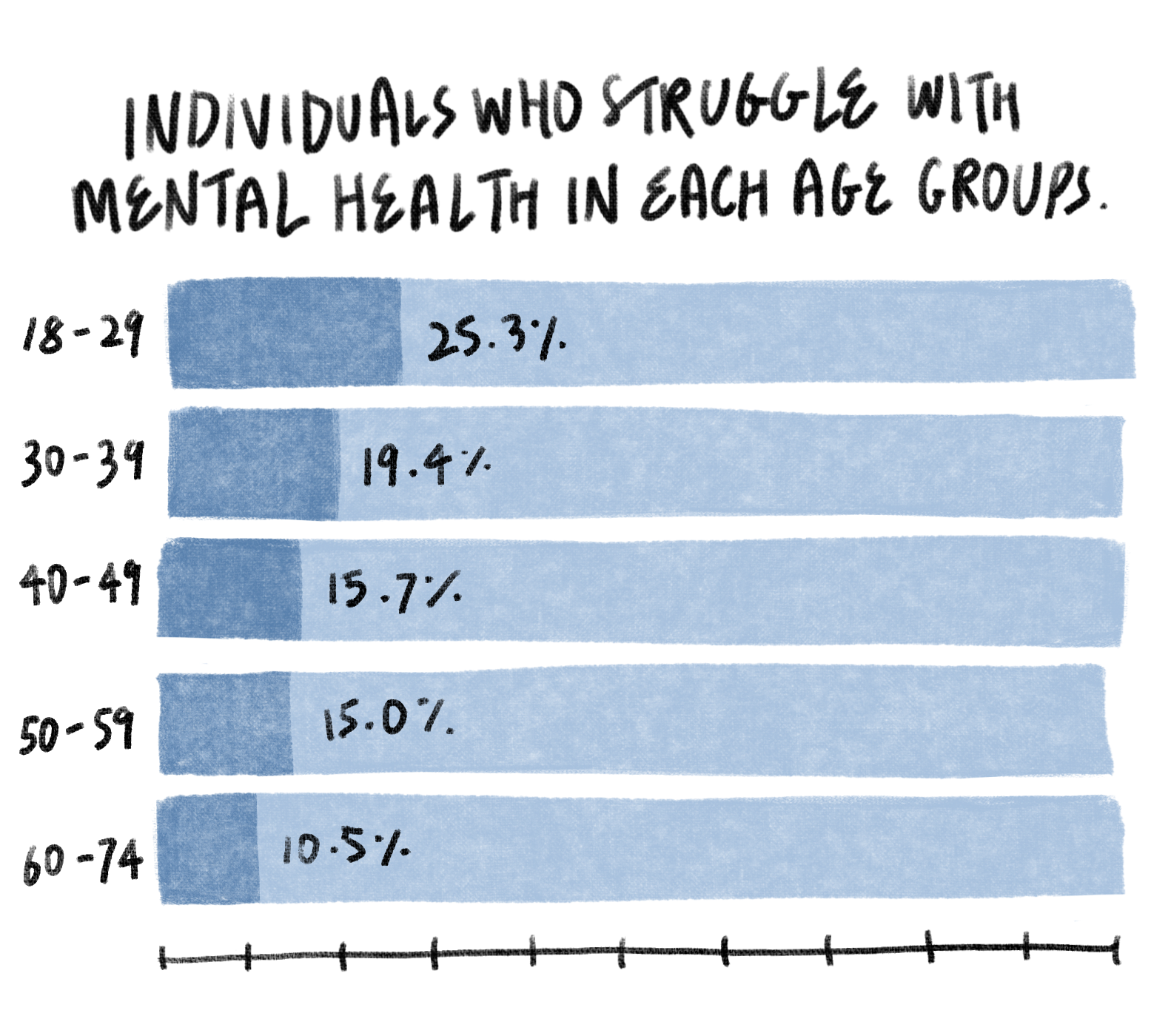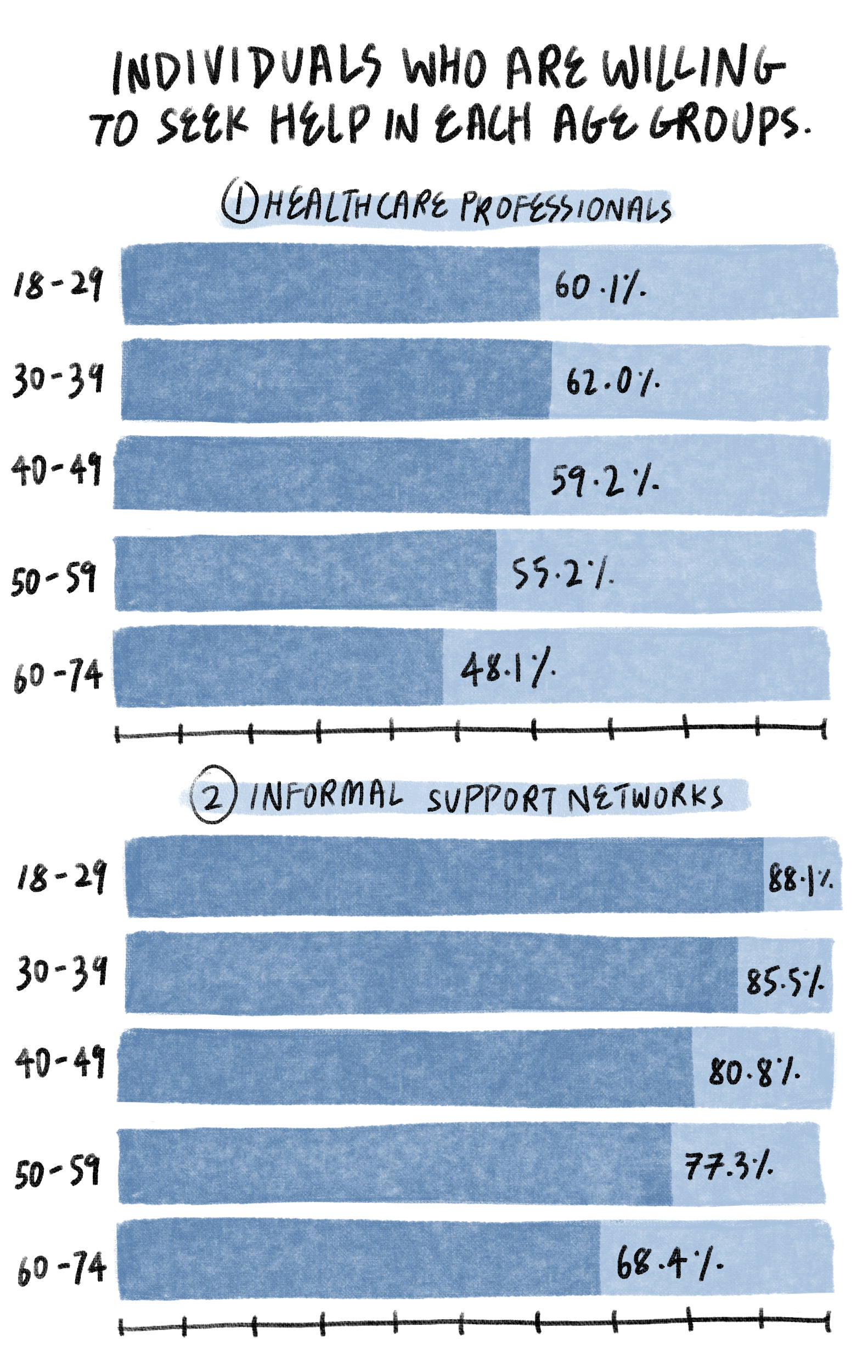On Wednesday, the Ministry of Health (MOH) released its findings from the National Population Health Survey 2022 which unveiled concerning insights about the mental health landscape in Singapore.
The results are definitely not great, though not too unexpected in my opinion; I say this because I am one of those who started struggling with mental health in recent times.

The report found that the percentage of Singaporeans who struggle with mental health has increased from 13.4% in 2020 to 17.0% in 2022.
That is almost 1 in every 5 people you meet in Singapore.
The report also looked at the age groups of respondents who said they struggle with mental health, and it was found that those aged 18 to 29 years old make up the highest percentage at 25.3%.

To put things into perspective, this 18-29 group are now the main contributors behind the overall increase to the number of Singaporeans facing mental health struggles.
This is up from 16.5% in 2017 to 25.3% in 2022, which means that the percentage has increased by nearly 9% in just five years.
In simple words, the mental health landscape for young adults is not improving but getting worse.

It was also found that there is a greater percentage of females who struggle with mental health than males. The numbers are 18.6% for females and 15.2% for males.
These numbers are… troubling, I know. I can’t even count how many times I’ve sighed whilst typing.
How do we even make sense of all these figures?
A Gen Z’s perspective
Honestly, I don’t think it is totally surprising that young adults (aged 18-29 years old) show the highest percentage of individuals struggling with mental health.
I believe it is because we are the most active on social media as compared to other age groups.
While young adults in the past dealt with stresses from entering the workforce, securing a good future, starting a family and so on, young adults nowadays struggle with all those and more due to the influence of social media.
We are constantly comparing our lives with what we see on social media: whether our life is as happening; whether our future is as promising; whether we have been to as many countries; whether our bodies look as good… the list is unending.
As the world becomes more and more connected, it also becomes noisier. We start to feel dissatisfied with our lives, and we find ourselves always wanting for more and dreaming for more.
This causes us to worry more and stress more. And for those who are unable to cope, we start to struggle with our mental health.
I chatted with a few female friends about this, and they shared that this is also likely the reason for a higher percentage of females struggling with mental health than males.
They told me that females are likely more vulnerable to body image anxiety when they see girls who are tall, lean and pretty on social media.
Some might also compare the number of branded fashion items or makeup products that they own.
They also mentioned that females might be more susceptible to mental health struggles because they are more “emotional” by nature, and might be more easily affected by what they see on social media (I’m not suggesting that males cannot or do not struggle with emotions).
Would you get help?
Here comes the interesting part: those surveyed were also asked if they are willing to seek help if they find themselves struggling with mental health.
In general, people across all age groups are more willing to seek help from informal support networks than from healthcare professionals.
The report defines healthcare professionals as counsellors, doctors, psychologists and psychiatrists. Informal support networks include friends, relatives, colleagues, religious leaders and teachers.

When we compare the numbers from these two categories, we find that the 18-29 group show the greatest willingness to seek help from informal support networks (88.1%) and healthcare professionals (60.1%).
The report noted that there is an overall increase in the willingness of Singaporeans to seek help if they are constantly unable to cope with stress and face mental health struggles.
This is a good thing. Indeed, the Ministry of Health also said that it “reflects continued public awareness of mental health and reduced stigma around mental health conditions”.
The Church has an important role to play
Whether you are a pastor, a cell group leader, or a Christian friend: we all have an important role to play.
We need to be part of the informal support networks that people are willing to turn to if they find themselves struggling with mental health.
And the goal is to point them to seek professional help as we love and support them.
When I first started struggling with mental health, I was clueless and helpless. I didn’t understand what I was going through, nor did I know how I could get help (not that I would even dare to).
I also felt like I had no one to confide in since I am a foreign student living alone in Singapore.
In an attempt to cope, I went on Google to learn more about mental health struggles. I also went to TikTok to understand how the life of someone who struggles with mental health is like.
To be fair, some of the information was indeed helpful. They helped me to understand why I felt certain ways and why my body reacted in certain ways.
But more often than not, what I read or saw left me feeling hopeless. It seemed like all these people who are struggling still do not have answers after many years of dealing with mental health. It seemed like no one could help them other than themselves.
It was an echo chamber of hopelessness, albeit one that I willingly stayed in because I could at least feel seen and understood.
… just as our Lord is close to the brokenhearted, we as His Church also need to be a safe place for those who are broken and struggling.
Eventually, by God’s grace, I found a few leaders in church who had personal experiences in this area and who were able to journey with me.
With their support, I also started seeking professional help and making sense of these struggles in light of my faith.
A refuge for the brokenhearted
“The Lord is close to the brokenhearted, and saves those who are crushed in spirit.” (Psalm 34:18)
I can’t really recall where I heard this from, but someone once made a remark about the Church’s role when it comes to mental health: “The Church might not be able to journey with people who struggle with mental health. But we must be able to love them.”
I find myself resonating with that statement a lot because it’s true.
The Church might not be the most equipped when it comes to mental health, and I don’t think our goal is to train every pastor or church leader to be a mental health professional.
But just as our Lord is close to the brokenhearted, we as His Church also need to be a safe place for those who are broken and struggling.
The Church has the advantage of reaching many youths and impacting their lives. Hence, we need to go beyond simply acknowledging mental health as a problem, and start bringing it to the pulpit.
Tithing is important. BGR is important. Serving is important. Evangelism is important… but so is mental health.
Having pastors talk about mental health will help to break the stigma that comes with it, and encourage more to open up and seek help.
We also get to shed light on how our faith is still relevant (in fact, it is the very thing that gives us hope) even for those who are struggling.
If not, the Church will face the risk of losing believers who struggle to navigate mental health woes. We might be labelled as hypocrites who only put love on our lips but are not able to love and support those who are in need (James 2:15-16).

One week, when the struggles hit me really hard, my cell group caught me completely off-guarded with a surprise.
Once the church service ended, they came over to my seat and surrounded me. And before I could figure out what was going on, they began passing me cards, eye masks, and offered to pray for me.
The surprise left me feeling incredibly touched because I only told a few people about how I was feeling that week. Yet, everyone offered their encouragement and support in their cards. Every one of them promised their prayers, presence and listening ears if I ever needed them.
I was touched not because they could solve my problems or because they understood what I was going through, but simply because they love and care for me even when I’m struggling.
I was touched not because they could solve my problems or because they understood what I was going through, but simply because they love and care for me even when I’m struggling.
So, pastors, leaders, cell group members, friends – we all have a part to play whether big or small. Some of us might not have the influence to speak to many, but we can certainly start by showing love and compassion to those around us.
May the Body of Christ stand with those who are suffering (1 Corinthians 12:26) to weather this mental health storm together.
- How do you feel reading about the findings from the survey?
- How can do your part in making the Church a safe space for those who are struggling?
- Do you know someone who’s struggling with mental health? Drop them a text to encourage them!









